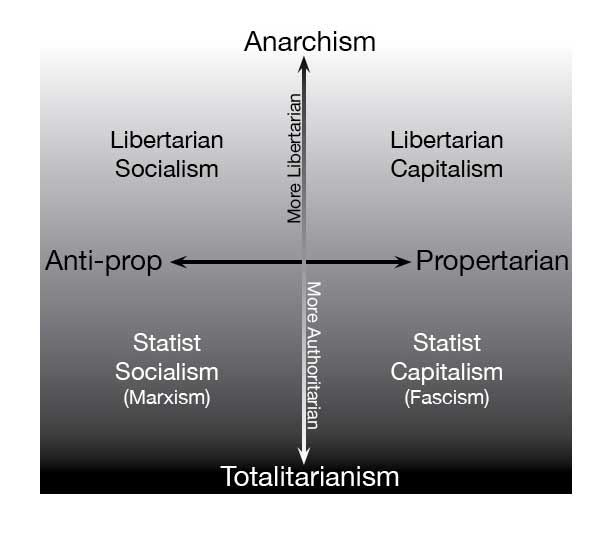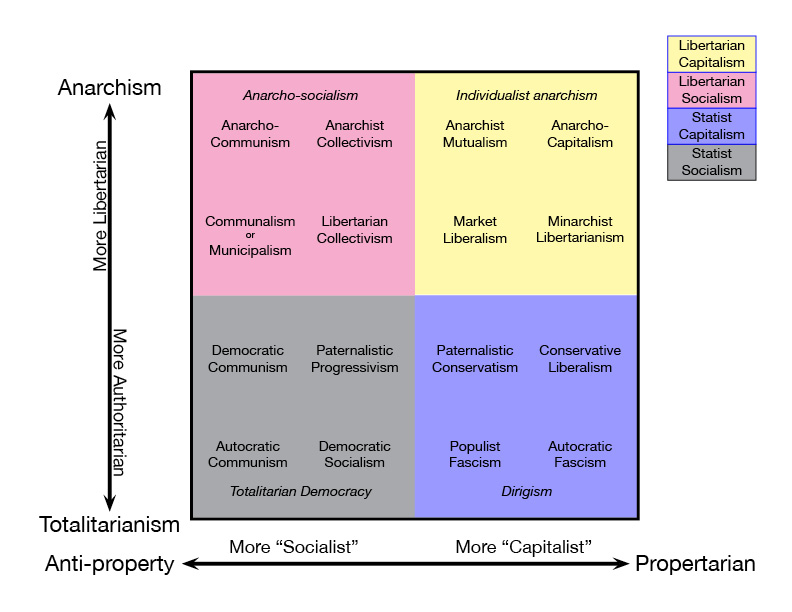Anarchism and Mass Society Theory
| Kornhauser's Mass Society |
Accessibility to the Elites | ||
|---|---|---|---|
| Low | High | ||
| Availability of the Non-Elites |
Low | communal | pluralist |
| High | totalitarian | mass society | |
| Kornhauser's Mass Society |
Accessibility to the Elites | ||
|---|---|---|---|
| Low | High | ||
| Availability of the Non-Elites |
Low | communal | pluralist |
| High | totalitarian | mass society | |
William Kornhauser put forth his theory of mass society in his 1959 book Politics of Mass Society. This is a sociological theory that attempts to explain mass movements and totalitarianism by looking at two factors - the accessibility to the elite and the availability of the non-elite. A summary of his theory can be seen in the table at right. Kornhauser expressed his theory like this:
Mass society is objectively the atomized society, and subjectively the alienated population. Therefore, mass society is a system in which there is high availability of a population for mobilization by elites ... people who are atomized readily become mobilized. ... [Mass society is one where] “both elites and non-elites lack social insulation; that is, when elites are accessible to direct intervention by non-elites, and when non-elites are available for direct mobilization by elites. - Kornhauser, Politics of Mass Society
This sociological theory may help explain our similar typology for political ideology. How well do Kornhauser's four categories correspond to our four political ideology categories?

- The low accessibility to the elites along with low availablity for mobilization of the masses corresponds reasonable well with the Libertarian Socialism quadrant of our modern ideomap.
Δ communal society ≡ libertarian socialism
(≡ democracy in Proudhon's model) - The high accessibility to the elites (which is the individual person for anarchism) along with low availablity for mobilization of the masses (due to the necessity for voluntary consent).
Δ pluralist society ≡ libertarian capitalism
(≡ anarchy in Proudhon's model) - The low accessibility to the elites along with high availablity for mobilization of the masses describes statist socialism and communism.
Δ totalitarian society ≡ statist socialism (≡ communism in Proudhon's model) - The high accessibility to the elites along with high availablity for mobilization of the masses (today characterized by mass media and propaganda) aptly describes the modern "democracies" of today.
Δ mass society ≡ statist capitalism (≡ monarchy in Proudhon's model)

Only the last, mass society, seems superficially unlike Proudhon's monarchy, but is this truly the case? Proudhon noted that his monarchy includes constitutional monarchies like Great Britain, and that monarchy has a liberal tendency. What Proudhon referred to as "moderated monarchy" seems to be roughly what we would call modern winner-take-all democratic oligarchy - the current status of most modern states. Thus, despite the outdated term "monarchy" Proudhon's typology seems to hold up quite well, although today we would call it "corporatism," "fascism," "neo-mercantilism," or simply "modern democracy."
Proudhon, leading modern anarchists, saw both (what he called) democracy and moderated monarchy, or in modern terms Statist Socialism and Statist Capitalism, as unstable. Democracy aka Statist Socialism, according to Proudhon, leads to dictatorship and empire. Caesar's dictatorship over Rome was one of his examples of how democracy results in the masses choosing a dictator over a republic.
But the same cause which sets the bourgeoisie and the people against each other soon leads both of them full circle. In order to ensure victory, democracy, since it is ignorant of the requirements of power and incapable of exercising it, equips itself with an absolute leader, before whom all privileges of caste disappear; the bourgeoisie, fearing despotism as much as it does anarchy, prefers to consolidate its position by establishing a constitutional monarchy. At the end of the day, indeed, it is the party with the strongest need for liberty and legality that creates absolutism, and the party of privilege which institutes liberal government, which it preserves by restricting political rights. - Pierre Proudhon, The Principle of Federation
It seems that the Mass Society theory of sociology reinforces and helps explain political theory's four main quadrants of the Political Ideology map. Of course, most actual States are hybrids of the four pure theoretical types. One can further subdivide the four quadrants into various currently existing ideologies. Any ideology on the top edge qualifies as anarchism by our modern (and as we saw, the original etymological) definition.

